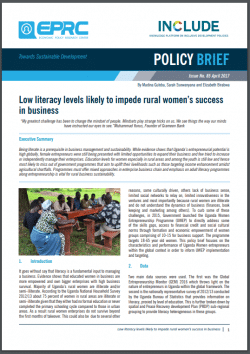
The African Policy Dialogue on women’s entrepreneurship and social protection in Uganda has published a Policy Brief on ‘Low literacy levels likely to impede rural women’s success in business’. The key findings from this Policy Brief are hat:
- Although Uganda’s entrepreneurial potential is high, female entrepreneurs have limited opportunities to expand their business and few tried to increase or independently manage their enterprises.
- A majority of Ugandan adult women, especially in rural areas, lack the necessary human capital requirement that is essential in business management.
- Uganda’s female Total-early Entrepreneurship Activity (TEA) rates are higher than their male counterparts. Therefore, adult females are more likely to start and own/manage a business enterprise in comparison to their male counterparts although these enterprises are of very low quality in terms of generating high income or decent employment.
- Women especially in rural areas and the youth with low levels of education are likely to miss out of government programmes that aim to uplift their livelihoods such as those targeting income enhancement amidst agricultural shortfalls.
Policy recommendations
- Use programmes that offer mixed approaches in enterprise business chain development to cater for differences between rural women and urban women businesses.
- Establish rural adult business literacy programmes to promote entrepreneurship and encourage completion of at least secondary education.
- Business Support Services (BDS) have to be part and parcel of any intervention targeting entrepreneurs right from the concept, formation and running of the enterprise.










